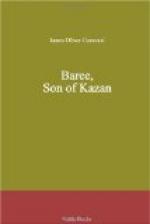All through the month of August Baree made the beaver pond his headquarters. At times his excursions kept him away for two or three days at a time. These journeys were always into the north, sometimes a little east and sometimes a little west, but never again into the south. And at last, early in September, he left the beaver pond for good.
For many days his wanderings carried him in no one particular direction. He followed the hunting, living chiefly on rabbits and that simple-minded species of partridge known as the “fool hen.” This diet, of course, was given variety by other things as they happened to come his way. Wild currants and raspberries were ripening, and Baree was fond of these. He also liked the bitter berries of the mountain ash, which, along with the soft balsam and spruce pitch which he licked with his tongue now and then, were good medicine for him. In shallow water he occasionally caught a fish. Now and then he hazarded a cautious battle with a porcupine, and if he was successful he feasted on the tenderest and most luscious of all the flesh that made up his menu.
Twice in September he killed young deer. The big “burns” that he occasionally came to no longer held terrors for him; in the midst of plenty he forgot the days in which he had gone hungry. In October he wandered as far west as the Geikie River, and then northward to Wollaston Lake, which was a good hundred miles north of the Gray Loon. The first week in November he turned south again, following the Canoe River for a distance, and then swinging westward along a twisting creek called The Little Black Bear with No Tail.
More than once during these weeks Baree came into touch with man, but, with the exception of the Cree hunter at the upper end of Wollaston Lake, no man had seen him. Three times in following the Geikie he lay crouched in the brush while canoes passed. Half a dozen times, in the stillness of night, he nosed about cabins and tepees in which there was life, and once he came so near to the Hudson’s Bay Company post at Wollaston that he could hear the barking of dogs and the shouting of their masters.
And always he was seeking—questing for the thing that had gone out of his life. At the thresholds of the cabins he sniffed; outside of the tepees he circled close, gathering the wind. The canoes he watched with eyes in which there was a hopeful gleam. Once he thought the wind brought him the scent of Nepeese, and all at once his legs grew weak under his body and his heart seemed to stop beating. It was only for a moment or two. She came out of the tepee—an Indian girl with her hands full of willow work—and Baree slunk away unseen.
It was almost December when Lerue, a half-breed from Lac Bain, saw Baree’s footprints in freshly fallen snow, and a little later caught a flash of him in the bush.
“Mon Dieu, I tell you his feet are as big as my hand, and he is as black as a raven’s wing with the sun on it!” he exclaimed in the company’s store at Lac Bain. “A fox? Non! He is half as big as a bear. A wolf—oui! And black as the devil, m’sieus.”




